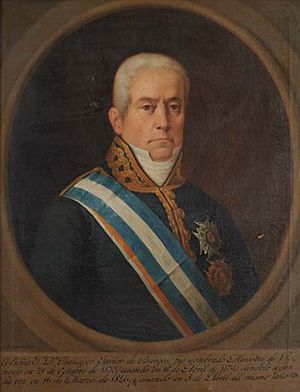Javier de Burgos facts for kids
Quick facts for kids
The Most Excellent
Javier de Burgos
|
|
|---|---|
 |
|
| Born |
Francisco Javier de Burgos y del Olmo
22 October 1778 Motril, Spain
|
| Died | 22 January 1848 (aged 69) Madrid, Spain
|
| Seat R of the Real Academia Española | |
| In office 7 January 1830 – 22 January 1848 |
|
| Preceded by | José Miguel de Carvajal-Vargas |
| Succeeded by | Juan Donoso Cortés |
Francisco Javier de Burgos y del Olmo (born October 22, 1778 – died January 22, 1848) was an important Spanish lawyer, politician, journalist, and translator. He played a big role in shaping Spain's government and how its regions were organized.
Contents
Early Life and Career
Francisco Javier de Burgos was born in Motril, Spain. His family was noble but did not have much money. He was first expected to become a priest in the Roman Catholic Church. However, he soon stopped his studies in Granada and moved to Madrid. There, he studied law.
When the French army, led by Napoleon I, invaded Spain in 1808, the Peninsular War began. Burgos supported the French side, like many others known as afrancesados. He worked in government jobs in Andalusia under King Joseph I, Napoleon's brother. Because he worked with the French, the Spanish royal family, the House of Bourbon, saw him as an enemy. This made him move to Paris, France, in 1812.
In France, Burgos continued his education. He studied the works of ancient writers, known as the Classics. He also started translating the writings of Horace, a famous Roman poet, into Castilian Spanish. Later, in 1844, he published a new version of his translations. Even though it had some flaws, it is still an important work today. People liked how he used a special poetry style called the sapphic stanza with free verse.
Political Influence and Achievements
Burgos returned to Madrid in 1819. In 1822, he became the editor of a newspaper called El Imparcial. This newspaper was a meeting point for people who believed in moderate liberal ideas and for the afrancesados. During this time, Burgos wrote many books, including a large work called Biografía universal.
He also joined the government of King Ferdinand VII. He was made an undersecretary in Francisco Cea Bermúdez's Ministry. Later, during the time when Maria Christina was ruling for her young daughter, Isabella II, Burgos became very influential.
Spain's New Provinces
Burgos was the main person behind the 1833 territorial division of Spain. He used his power to change Spain's old way of organizing its regions. He wanted to create a new system based on provinces. He believed Spain needed a centralized government, meaning the main government in Madrid would have more control over all parts of the country.
However, his plan caused problems with the self-governing rights of the Basque regions, especially Navarre. Navarre had been a free-standing Kingdom with its own special laws. Burgos's new system was approved in late 1833. In the same year, he became the Home Minister.
Later Political Roles
On January 7, 1830, Francisco Javier de Burgos was chosen to be a member of the Real Academia Española, which is an important institution for the Spanish language. He held this position until his death.
During the rule of Queen Isabella II, Burgos became a senator for the "Moderado" liberals. He also served as a royal advisor and the Interior Minister for the first government led by Ramón María Narváez y Campos, Duke of Valencia. When Narváez's successor, Francisco Javier Istúriz, took over, Burgos's role as Minister ended. He passed away in Madrid.
Besides his political work, Burgos also wrote poems. Some of his poems marked important events, like the death of María Isabel de Braganza and the wedding of King Ferdinand VII and Maria Christina. He also wrote a notable poem called Oda a la Razón (Ode to Reason).
See also
 In Spanish: Javier de Burgos para niños
In Spanish: Javier de Burgos para niños
 | Sharif Bey |
 | Hale Woodruff |
 | Richmond Barthé |
 | Purvis Young |

